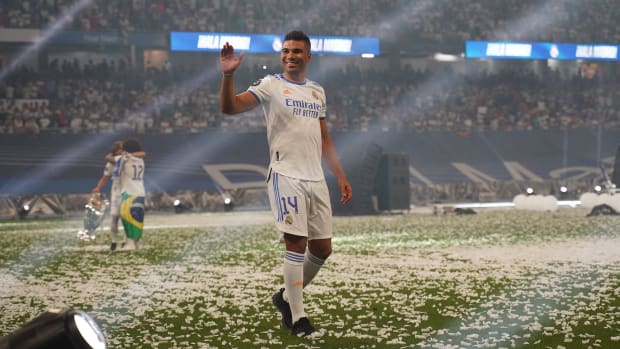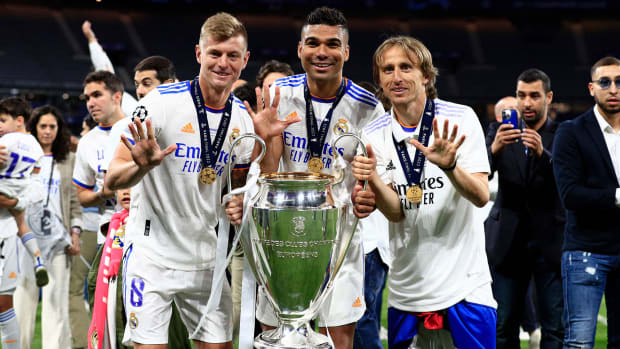A late, pricey pivot to lure the veteran Real Madrid midfielder to Old Trafford as part of a reactive transfer mad dash is quite emblematic of United’s current status.
Casemiro is a very good footballer. He has won five Champions League titles and has been, with Luka Modrić and Toni Kroos, part of one of the greatest midfields football has ever known. He may turn out to be a very effective signing for Manchester United; certainly the club has needed a high-class holding midfielder for years. And yet such is the level of chaos into which the club has slipped that his forthcoming transfer seems only to emphasize the club’s lack of planning.
With United, it feels, every decision cuts across the previous one the club made. Why was Erik ten Hag appointed as manager? Presumably it was because of the success he had had at Ajax, where he played a high-pressing game based on the Total Football model. The sense was that, at last, United had acknowledged the need to modernize. And yet with the signing of Casemiro, United now has more than a quarter of the Real Madrid lineups that won consecutive Champions League titles in 2017 and ’18, and that side categorically did not play hard-pressing, Ajax-style football.
Perhaps signing Casemiro does make sense to shore up an era of the team that has desperately needed bolstering. But what is ten Hag supposed to do? He is already hampered in his attempts to impose his philosophy by a goalkeeper who cannot pass—David de Gea completed the fewest passes of any top-flight goalkeeper last season—and by a center forward in Cristiano Ronaldo who not merely refuses to press but tries to deflect training away from pressing drills. If ten Hag compromises, then why is he there? What is he building? But if he does not, the result is a shambles such as what happened at Brentford last Saturday.

CordonPress/Imago Images
Those three former Real Madrid players (Raphaël Varane being the third) have a combined age of 96. This is not long-term planning. In fact, it doesn’t seem much like planning at all. United spent most of the summer chasing Barcelona’s Frenkie de Jong, who had played for ten Hag at Ajax. He is a player who could provide an obvious basis for ten Hag’s vision of United. Having failed to land him, United then turned its attention to Adrien Rabiot, a wholly different type of midfielder. And when that deal stalled, United turned to Casemiro, a midfielder of a totally different profile.
A reported fee of $60 million, plus a possible $10 million in add-ons, is huge for a 30-year-old. He will become the second-most expensive 30-something of all time (after Ronaldo, when he joined Juventus). Footballers’ careers are getting longer. That might not be a major issue. But equally, footballers beyond the age of 30 are more prone to injury. They have little to no resale value. That $70 million will not be recouped.
United has also been linked, again, with the Ajax winger Antony. An $80 million bid has apparently been rejected, which demands the immediate question: If $150 million or more was there all along, why is it being spent in a panic now? Why was it not used before, when new signings could have properly integrated in preseason instead of during a bottom-of-the-table crisis two games into the new season?
Yet again, recruitment seems limited to famous players who have been in the game for years, or people ten Hag knows from the Eredivisie. Is there a scouting department at United? And if there is, what does it actually do? It certainly doesn’t uncover little-known bargains. The last 30-something signed by Liverpool was Ragnar Klavan in 2016. The last 30-something signed by Manchester City was Bacary Sagna in ’14. Generally speaking, well-run clubs do not sign older players. (Conversely, the selling club, Real Madrid, has Casemiro’s successors already in-house.)

John Patrick Fletcher/Action Plus
But United is not a well-run club. Perhaps these short-term measures are necessary to at least get things moving in what is vaguely the right direction while ten Hag maps out a longer-term future. Casemiro and Fred have started 10 games together for Brazil since the start of last year, so perhaps there’s a knock-on effect that translates to the club level and helps his much-maligned countryman. Perhaps this is the beginning of a new Manchester United, where it wins some games, stops the rot and starts to clear the ground for the ten Hag project.
If it is, though, when did this plan come into being? Two days ago? Three? The Glazers have shown absolutely no inclination of aptitude for long-term planning. Why should anybody believe they’re about to start now? Why would this short-term fix lead to long-term success rather than more short-term fixes? Short-term fixes, a lack of a coherent vision, are what have gotten United into this mess.
And that’s where United is currently. Even when it signs good players who answer a glaring need in the squad, the expectation is that of a shambolic outcome.
More Soccer Coverage: